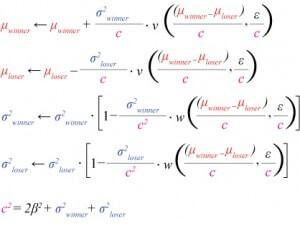Advice for Employers and Recruiters
Better Recruiting Technique: Alchemy or Algorithms?
Alchemy attempts to take common materials and transform them into something rare and valuable. I don’t think anyone has succeeded in this endeavor to date.
Unlike alchemy, algorithms can turn raw goods into gold. The raw goods can be candidate evaluation data and the gold is on-the-job performance. However, many recruiters have not invested in the data collection and analysis required to create an algorithm. As such, they make decisions based upon anecdote and conjecture.
Stock traders want to predict future prices and values of individual companies and broader indices. Recruiters want to predict future behaviors and on-the-job results of candidates. Algorithms are used by the best-in-class of both of these disciplines. And the results they achieve are documented by superior outcomes.
The reason both of these professions use algorithms is to identify meaningful relationships among complex data sets.
Variables that drive company performance and market fluctuations are complex. And, there is likely no doubt in your mind that variables which drive people’s performance are complex, very complex. In fact you might assert people are unpredictable. If that was really the case the workplace would be chaos. And that is just not true. There are some predictable elements.
Algorithms are special equations, expressly for the purpose of teasing out insights and conclusions from complexity.
When used well, the outcome of algorithms increases the probability of making a correct decision more often than not. An algorithm based upon pre-employment testing brings a sophisticated level of HR Analytics that can dramatically improve your quality of hire.
Algorithms were used to determine the premium for your auto insurance, your credit score, the offer you received for a vacation package, and the books recommended for you in on-line shopping. In each case two or more large data sets were analyzed to determine the nature and significance of relationship that exist between and among the variables.
Big Bucks for Equations.
In a current algorithm competition $3 million is being offered for the equation that takes large data sets of health care and lifestyle information and calculates the likelihood of an individual being hospitalized sometime in the future. The underlying assumptions are two-fold. You could be charged a higher insurance premium based upon your probable path to the hospital, or you could be given a specific preventative intervention to reduce or eliminate the necessity of being admitted for medical care.
Why a competition? The analysis and mental energy required to derive the equation is significant. Asking one individual to undertake the work may take a long time. A competition can attract the intellectually curious and competitively driven statisticians. Having a solution sooner than later is valuable.
How much would your organization pay for an algorithm that predicted your customer’s behavior? Or possibly a more accurate question is how much has your organization already paid in an effort to better understand and predict your customer’s behavior. Go ask your chief marketing officer.
Ego or Evidence?
Best-in-class recruiting professionals use algorithms. (We can introduce you to some of them.) Each hiring decision is supported with evidence. But, just like the challenge in the competition, developing algorithms require thoughtful effort. When I describe the process of developing a recruiting algorithm, I get two reactions. One says,”That seems like a lot of work.” The other states. “That seems like it can add significant value to our process.”
Algorithms are derived from analyzing large data sets. Three data sets are required for transforming recruiting raw goods into job performance gold:
- Candidate Evaluation data – pre-employment assessment
- Behavior/Competency Evaluation data – supervisor ratings
- Productivity Evaluation data – objective metrics of on-the-job performance
Recruiting professionals working at the leading edge of candidate evaluation capture 200 to 300 data points from candidate evaluation. The data encompasses work history, work style and work samples.
Similarly, job performance, as defined by 100 to 200 data points from ratings and metrics for each individual provides a robust description of the complexity inherent in any job and the company culture in which it occurs.
When a recruiting professional embarks on capturing this level of data on their staffing process and its outcome as job performance they have the raw goods for the algorithm that predicts the future and answers the essential question – which candidates are more likely to be successful on the job. Working with this type of information delivers a very powerful recruiter experience, adding both efficiency and effectiveness.
Differentiated Workforce
And, that ability to differentiate among candidates is competitive advantage. Michael Porter the strategy guru at Harvard states competitive advantage comes from business processes which are difficult to replicate. In their book The Differentiated Workforce, authors Beatty, Becker and Huselid assert competitive differentiation comes from efforts that align jobs with strategic capabilities. (see page 10).
Using an off-the-shelf assessment, and generalized validity is defined as a ‘Me Too” strategy, one that is easy to replicate. An algorithm which predicts candidate performance in your organization is impossible to replicate. Call us to explore what it might take to transform your candidate experience into competitive advantage and a strategic business driver.
It’s not alchemy, it’s algorithms. And they really do turn raw goods into gold. Employees who perform at gold star levels.
This article provided by permission from Joseph P. Murphy of Shaker Consulting Group. Deliver an exceptional candidate experience with Shaker Consulting Group’s Virtual Job Tryout®. Obtain a work sample that predicts on-the-job performance. Identify best-fit candidates at the click of mouse. Click here for a 3 minute overview.
New Job Postings
Advanced Search
